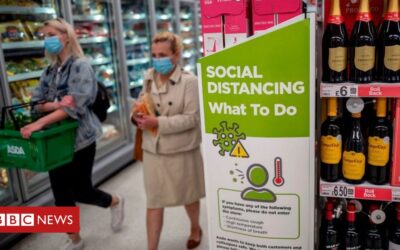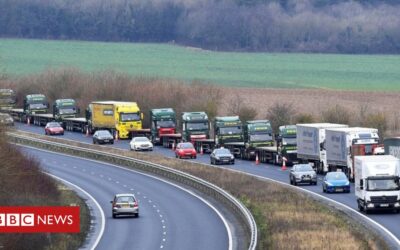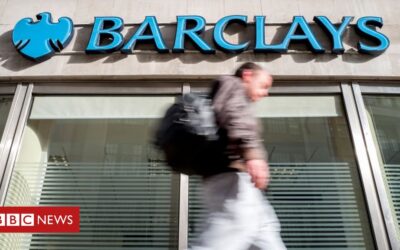Supermarket Asda is set to enforce rules on face coverings more strictly across its shops amid the pandemic.Customers who do not have a covering when they enter a store will be offered a pack of disposable masks that they can pay for at the end of their trip.”We know that safety remains a key priority for our customers,” its chief operating officer said.Face coverings must be worn by customers in shops, supermarkets and shopping centres around the UK.Those who fail to do so can be fined by the police – up to £100 in England (soon to rise to £200), or £60 in Scotland, Northern Ireland and Wales.What are the rules for face masks or face coverings?
Making shoppers wear masks could ‘trigger abuse’, warn unions
Asda announced on Wednesday that it will create 1,000 new “safety marshal” roles across its 639 UK stores.Dedicated staff will remind shoppers to wear face coverings in-store and provide customers with sanitised shopping baskets on arrival.The supermarket chain said it will also install extra hand sanitiser stations in the busiest sections of its shops.Anthony Hemmerdinger, chief operating officer at Asda, said: “We know that safety remains a key priority for our customers and we will continue to do all we can to keep them and our colleagues safe in store, as we have since the start of the pandemic. “These additional measures will make our stores an even safer place to shop and work during the coming months.”Following a recent change in government guidance, face coverings are now also compulsory for shop workers in England.Asda confirmed all of its staff across England, Wales and Scotland will now wear a covering while at work – unless they have a medical exemption.Asda’s announcement on Wednesday followed on from the news that Morrisons has reinstated marshals on the doors of its 497 supermarkets to better monitor shopper numbers and remind those entering to wear a face covering.Morrisons has also created 2,420 new cleaning roles across its shops. Each one of its supermarkets will also undergo a “deep clean” every three weeks.Jayne Wall, operations director at Morrisons said: “The hygiene within our stores has become more important than ever due to the impact of Covid-19. “We want to make sure our customers feel as safe as possible when doing their grocery shopping with us. So we’ve made this multi-million-pound investment to introduce first-class hygiene procedures.”‘Abuse is not part of the job’Some industry figures have warned, however, that staff enforcing rules on face coverings may be subject to abuse from customers.Trade union Usdaw called on shoppers to “respect retail workers and follow the necessary in-store safety measures to keep us all safe”.General secretary Paddy Lillis said: “We are deeply worried about safety measures not being followed and the impact that has on the safety of staff.”Usdaw members in food retail are key workers delivering an essential service and have worked extremely hard in stressful environments to ensure that the nation remains fed. “Despite this, during the height of the first wave of the outbreak, violence and abuse toward shop staff doubled. It is clear that such behaviour is unacceptable: abuse is not part of the job.”Tom Ironside, director of business and regulation at the British Retail Consortium, said: “Retailers are working hard to keep their customers and staff safe throughout this pandemic. They have spent hundreds of millions of pounds on coronavirus safety measures including perspex screens, social distancing measures and additional hygiene measures. “Retailers support all necessary safety measures including the use of face coverings for all staff.”In March, UK supermarkets were forced to take steps to prevent shoppers from panic-buying around the height of the pandemic. Many introduced limits on the number of certain items that customers could buy, such as flour, pasta or toilet roll.Enhanced measures introduced in recent weeks have not triggered stock-piling by customers, according to several supermarkets approached by the BBC.Asda said it still had good availability in-store and online, while Tesco – the UK’s largest grocer – is not experiencing any product shortages either.Waitrose said it had “good levels” of stock and that it had also looked at the items people bought early in lockdown and planned ahead accordingly.”We would like to reassure customers that there is no need to worry about buying more than they need,” a spokesperson said.An Iceland spokesperson said: “There are no shortages and there will be no shortages so long as people continue to shop responsibly for what they actually need.”
BBC Business News Articles
Does BlackRock have the world's toughest rules on romance?
New rules over office romances are being rolled out at the investment giant BlackRock.They will now extend to relationships outside the office in a bid to clamp down on conflicts of interest.BlackRock staff were already expected to tell managers if they were dating one of their 16,000 colleagues. But the new policy, shared in a memo with staff, says they must disclose relationships with “external partners” with a connection to the firm.The size of the New York based firm, which has more than $7tn under management and vast numbers of suppliers and clients around the globe, means that the new rules will have far-reaching implications, shining a probing light into the personal lives of potentially hundreds of thousands of people.It follows the #Metoo movement, which revealed sexual harassment within a range of professional settings and focused attention on workplace strategies to clamp down on relationships between bosses and subordinates.McDonald’s chief executive Steve Easterbrook was removed last year after a relationship with a colleague came to light. At BlackRock late last year senior executive Mark Wiseman, was fired for failing to disclose an affair with a colleague. He had been tipped as a possible successor to the firm’s high profile chief executive Larry Fink. McDonald’s ex-boss fights sexual liaison claims
Work romance: ‘I was sacked for falling in love’
While many workplaces require staff to be open about relationships with colleagues, BlackRock’s new policy is unusual in asking for information about partners at other firms.The policy says they should disclose any personal relationship they have at any “service provider, vendor, or other third party (including a client), if the non-BlackRock employee is within a group that interacts with BlackRock”, according to the internal memo, seen by the BBC.The aim is to tackle any conflicts of interest, or perceived conflicts of interest, by taking the matter out of the hands of the employee concerned and allowing human resources and lawyers at the firm assess whether there is a problem.But there is a new urgency around managing private and professional boundaries thanks to the switch to working from home prompted by the pandemic.”I can see why it is an issue for [BlackRock],” says Tom McLaughlin, employment lawyer with BDBF. “We are staring down the barrel of the majority of office workers working from home again. Employers will realise they do need to know more about people’s domestic arrangements than they did before.”The new policy defines which relationships come under the new policy as any that could be “susceptible to perceived impropriety, bias, favouritism, and/or abuse of authority within a work environment”.That includes not only romantic or sexual relationships, but family connections and outside business interests,but not “friendships with work colleagues.”However it is not clear from the memo where the threshold lies, at what point does a friendship, or a series of dates, becomes significant enough to require disclosure.There is no law prohibiting employers from asking questions about relationships, but the answers will need to be treated carefully to comply with privacy rules.”The real crunch will come if there is a perceived conflict of interest,” says Mr Tom McLaughlin.BlackRock says disclosures would be treated with discretion, and if necessary, “alternative work arrangements” may be put in place.Did you meet your partner through work contacts? Do you agree with BlackRock’s new rules or do they go too far? Get in touch: [email protected] include a contact number if you are willing to speak to a BBC journalist.
If you are reading this page and can’t see the form you will need to visit the mobile version of the BBC website to submit your response or send it via email to [email protected]. Please include your name, age and location with any response you send in.
Upper Crust owner: 'Demand for travel will return'
Upper Crust owner SSP Group says it believes that “demand for travel will return”, despite the coronavirus pandemic dragging down sales.The firm said weekly sales are currently 76% below the levels seen for April to September last year.SSP said about a third of its outlets, mostly found at railway stations and airports, had reopened despite the pandemic.It has reopened units “swiftly” in response to improving demand, it said. The group, which also owns the Caffè Ritazza chain and deli operator Camden Food Co, and operates in 35 countries around the world, said that 1,100 of its outlets were now open.Its chief executive Simon Smith said: “We have seen some improvement in passenger demand since the start of the crisis and we have reopened units swiftly and profitably in response to this, with over one third of our units now trading. “Our model is flexible and we will continue to align unit openings with demand, meeting the needs of our customers whilst managing operating costs and cash flow tightly.”In the medium-term we expect to see the gradual return of passenger travel to more normalised levels,” he said.
Brexit letter warns of 7,000-truck queues in Kent
Exporters to the EU face 7,000-truck-long queues in Kent and two-day delays to trade after the Brexit transition period ends, the government has warned.Imports will also be disrupted in January, according to a letter from cabinet minister Michael Gove to the freight industry, seen by BBC News. It also raises the prospect of a winter spike in Covid-19 leading to absences of port and border staff.The transition period is due to expire at the end of the year.Mr Gove, the Chancellor of the Duchy of Lancaster, responsible for no-deal planning, wrote to logistics groups with the government’s “reasonable worst-case scenario” planning for when the UK leaves the EU’s single market and customs union rules on 1 January. He will outline the scenario, which the Cabinet Office stressed is not a forecast, in the House of Commons later.The picture of chaos at the border might be familiar from a similar set of projections made for no-deal Brexit a year ago as part of what was known as Operation Yellowhammer. The government says this is not a prediction but an illustration of what could be reasonably expected. ‘Disrupted’According to the Cabinet Office document, in its reasonable worst-case scenario, there may be “maximum queues of 7,000 port bound trucks in Kent and associated maximum delays of up to two days”.”Both imports and exports could be disrupted to a similar extent,” it says.This is caused by up to 70% of freight trucks travelling to the EU being unprepared for new border controls, including up to half on the busiest “shorts straits” routes Dover to Calais and in the Eurotunnel. The EU is expected to impose full goods controls on the UK, stopping all freight without the correct documentation at the end of the transition period on 1 January.The disruption is assumed to build in the first two weeks of January, and could last three months, or longer should France rigorously apply Schengen passport checks on hauliers at Dover and the Channel Tunnel.Brexit jargon explainedThe purpose of this stark communication is to try to get traders to act now to get ready for new border formalities that could help mitigate the disruption. Mr Gove told the industry that this needs to happen irrespective of whether or not there is a deal in the UK-EU trade negotiations.The freight industry itself has expressed, in recent days, its concern that the government is not fully prepared with the plans and systems in place to deal with post-Brexit changes, particularly against the difficult economic backdrop of the pandemic.’Fraught’ relationshipA recent meeting between the industry and government was described as a “washout”, with insiders describing the relationship as “fraught” and hauliers fearful that they were being cast as the “fall guys” for delays and disruption likely in January.There are further issues should there be no trade deal agreed. Hauliers would have to rely on special permits rationed by the Department for Transport, though a mutually beneficial deal here is possible. But discussions on these issues await settlement of the impasse in negotiations on state aid and fisheries. Industry sources have raised the possibility that the UK would have to sign up to EU rules limiting driver hours, in order to get access to EU roads.And there is a specific new reference to France imposing strict passport checks at the “juxtaposed controls” currently designed to offer seamless travel across the Channel. “There also remains a risk of continuing disruption caused by Schengen controls being applied rigorously at the juxtaposed controls at the Port of Dover and Eurotunnel,” the document says.Mr Gove, in his letter, says the government will introduce a “Smart Freight” IT service to enable drivers and hauliers to complete a border readiness check. The information will be shared with Kent Police to ensure only compliant vehicles travel to the Port of Dover and Eurotunnel. An updated model for border arrangements is also expected in the coming days.But the limited level of trader readiness is a real problem. Many of the changes are required not just because of the possibility of there not being a trade deal with the EU, but as a result of formally leaving the single market and customs union.
How much gold is there left to mine in the world?
Last month the price of gold hit a record high, pushing above $2,000 (£1,575) an ounce.While this price rise was driven by gold traders, it begs the question about the supply of the precious metal, and when it will eventually run out.Gold is in hot demand as an investment, a status symbol, and a key component in many electronic products.But it’s also a finite resource, and there will eventually come a stage when there is none left to be mined.Peak goldExperts talk about the concept of peak gold – when we have mined the most we ever can in any one year. Some believe we may have already reached that point.Gold mine production totalled 3,531 tonnes in 2019, 1% lower than in 2018, according to the World Gold Council. This is the first annual decline in production since 2008. “While the growth in mine supply may slow or decline slightly in the coming years, as existing reserves are exhausted, and new major discoveries become increasingly rare, suggesting that production has peaked may still be a little premature,” says Hannah Brandstaetter, a spokesman for the World Gold Council.Even when peak gold happens, experts say the years immediately after it are not likely to see a dramatic decrease in production. Instead, we could see a gradual depletion of output over a few decades. “Mine production has flat-lined, and is likely on a downward trajectory, but not dramatically so,” adds Ross Norman of MetalsDaily.com. So how much is left?Mining companies estimate the volume of gold that remains in the ground in two ways:Reserves – gold that is economic to mine at the current gold priceResources – gold that will potentially become economic to mine after further investigation, or at a higher price levelThe volume of gold reserves can be calculated more accurately than resources, although this is still not an easy task.The below-ground stock of gold reserves is currently estimated to be around 50,000 tonnes, according to the US Geological Survey. To put that in perspective, around 190,000 tonnes of gold has been mined in total, although estimates do vary. Based on these rough figures, there is about 20% still to be mined. But this is a moving target.New technologies may make it possible to extract some known reserves that aren’t currently economical to access.The most recent innovations include big data, AI, and smart data mining, which can potentially optimise processes and bring down costs.Robotics are already being used at some sites, and are expected to increasingly become standard technologies in mine exploration. Biggest sources The largest single source of gold in history has been the Witwatersrand Basin of South Africa. Witwatersrand accounts for roughly 30% of all the gold ever mined. Other major sources of gold include the extremely deep Mponeng mine in South Africa, the Super Pit and Newmont Boddington mines in Australia, Indonesia’s Grasberg Mine, and mines in Nevada, US.China is currently the world’s biggest miner of gold, while Canada, Russia, and Peru are also major producers.In terms of companies, Barrick Gold’s majority-owned Nevada Gold Mines is the single largest gold-mining complex in the world, producing about 3.5 million ounces a year.Though new gold mines are still being found, discoveries of large deposits are becoming increasingly rare, experts say. As a result, most gold production currently comes from older mines that have been in use for decades. Harder to mine?Large-scale mining is extremely capital-intensive, employing lots of machinery and expertise to mine vast areas on and below the surface.Today, around 60% of the world’s mining operations are surface mines, while the remainder are underground ones.”Mining is getting harder in the sense that many of the large, low-cost mines, and older ones such as in South Africa, are nearing exhaustion,” adds Mr Norman.”Chinese gold mines, on the other hand, are much smaller, and therefore have higher costs.”There are relatively few unexplored regions left for gold-mining, although possibly the most promising are in some of the more unstable parts of the world, such as in West Africa.Record highsAlthough gold prices hit a record high in August, this doesn’t automatically translate into a rise in gold mining activity.In fact, changes in gold mine production often lag changes in the gold price very significantly. “Given the scale of operations involved, it takes time to alter mine plans in response to changes in external factors, such as the price of gold,” adds Ms Brandstaetter.Also, the record prices have happened during Covid-19 restrictions, making it harder to mine, as sites were closed or partially shutdown to curb the spread of the virus.Price rises have actually been driven by the pandemic as investors view gold as a safer asset in times of economic uncertainty.Unlikely placesWhile gold in the ground may be hard to quantify, it’s not the only source. There is also gold on the moon. However, the costs associated with mining it and transporting it back to earth are significantly higher than the value of the gold. “Whilst it exists, it would never be economically meaningful to mine it,” says space expert Sinead O’Sullivan. “You would lose an infinitely larger amount of money mining it than you would gain by selling it.”Similarly, there are some known gold deposits in Antarctica that may never be economical to mine, due to the continent’s extreme weather conditions. Gold is also scattered along the ocean floor, but is also considered uneconomic to mine.One factor gold has on its side though is that, unlike other non-renewable resources like oil, it can be recycled. So we will never run out of gold, even when we can no longer mine it.A large amount of gold is used in electronic products that are widely viewed as disposable, such as mobile phones. The amount of gold in the average phone is worth a few pounds.Efforts to recycle gold extracted from electronic waste are already well under way.
Nike expects permanent shift to online sales
Sportswear firm Nike has seen a huge rise in online sales as it bounces back from a coronavirus slump.The US company saw digital sales rocket 82% during the June to August quarter, offsetting falling revenue in its stores.On Tuesday, Nike posted revenue of $10.6bn (£8.3bn) as many of its key markets recovered including China.For its previous quarter revenues were down by more than a third as it tackled store closures and lockdowns globally.Nike chief executive John Donahoe said the shift to online sales could be a permanent trend.”We know that digital is the new normal. The consumer today is digitally grounded and simply will not revert back,” Mr Donahoe said.
Media playback is unsupported on your device
Sales are growing in its major markets including China, Japan, South Korea and the UK, while its core North American market is declining.Nike’s shares rose more than 10% in late trading in the US, as the results were better than Wall Street had expected.Direct sellingNike has been using its website and shopping apps to release limited edition footwear.The sportswear giant has been transforming itself to sell directly to customers over the past few years, reducing its store presence and retail partners.While many gyms have been closed during the pandemic, sportswear makers have reported strong demand for more casual attire as more people work and exercise at home. Rival Adidas said last month that it was seeing improving sales trends while yoga pants maker Lululemon posted a 157% jump in its online business.Like many other retailers, Nike is still limiting the number of people who can come into its stores at once to try to help curb the spread of the virus. But when people do visit, they’re coming with the intent to buy, Nike said.
Musk: Cheaper Tesla ready 'in about three years'
By James ClaytonNorth America technology reporterimage copyrightGetty ImagesTesla founder Elon Musk has announced technology that he says will make Tesla batteries cheaper and more powerful.At a live presentation that Mr Musk labelled ‘Battery Day’ he also teased the possibility of a $25,000 (£19,600), fully-autonomous Tesla “in about three years time”. “This has always been our dream to make an affordable electric car,” he said.But the news didn’t excite investors and $50bn was wiped off its stock market value.The main announcement was Tesla’s new larger cylindrical cells. It was claimed the new batteries will provide five times more energy, six times more power and 16% greater driving range.But the technology announced is likely to take years to implement. Tesla’s approach includes integrating the battery so that it forms part of the structure of the vehicle, thereby reducing the effective weight of the battery.image copyrightTeslaThe speech took place in front of 240 shareholders – each sitting in a Tesla Model 3.Central to cheaper Teslas are innovations in the way the company designs batteries – radically improving their efficiency. Prof Stanley Whittingham – who was awarded the Nobel Prize in Chemistry last year for his work on lithium-ion batteries – told the BBC that “tackling all the opportunities is high risk, but high pay-off”.”Many of us have suggested the same steps are necessary, but Tesla has the investment and will to make it happen. Not sure anyone else is willing to do this,” he said. Mr Musk also announced that as well as purchasing batteries from Panasonic and LG Chem – Tesla itself would begin to make them. In April last year, Musk himself revealed problems with sourcing Panasonic batteries used in its Model 3 Tesla. One expert said scaling up would be “challenging”.”Even with really experienced car manufacturers, we tend to see a very high scrap rate of production in the first couple of years,” said Casper Rawles, head of price assessments at Benchmark Mineral Intelligence.Mr Rawles also warned that so much of the content of the battery is expensive metals – “You can only reduce the cost down to a point”.Four consecutive quarters of growth have helped Tesla’s share price soar and it is now the most valuable car company in the world. image copyrightTeslaThis is despite criticisms of Elon Musk that some of his technological advances have been exaggerated. Earlier this month, customer group Consumer Reports released a damning report about Tesla’s automated driving services. The research concluded that “for now, full self-driving capability… remains a misnomer”.And in July, Mr Musk said Tesla would be able to make its vehicles completely autonomous by the end of this year. The statement was met with scepticism by industry insiders. Tesla’s boss however announced that a “beta” version of the full Autopilot software would be available “in a month or so”.Musk is no stranger to glitzy and sometimes bizarre public demonstrations. Earlier this month he unveiled a pig with a coin-sized computer chip in its brain to demonstrate his ambitious plans to create a working brain-to-machine interface.Related TopicsElectric carsCar industryBatteriesElon MuskTeslaMore on this story
Could churches double up as bank branches in cash-stricken areas?
A financial hub in a Methodist church and drop-and-go deposit points for small firms are among ideas being tested in cash-stricken communities.Local people will also have access to cashback from convenience stores – even if they do no shopping.Eight trials have been confirmed as part of a project to help solve problems with access to cash.The closure of bank branches and cash machines has led to losses for local firms and has concerned consumers.The plan for trials was drawn up in light of a major report warning that the country is “sleepwalking” into becoming a cashless society.It concluded that eight million people in the UK rely on notes and coins, ranging from those without a bank account to people who are not comfortable with digital payments.’No shopping, no problem’The eight trial areas, including remote communities such as the village of Botton, North Yorkshire, will test a range of ideas including pop-up Post Offices in small shops, and banking hubs in retail spaces. Fifteen shops in four areas will trial the purchase-free cashback plan. Retailers will be remunerated for providing the service by payment services company PayPoint.Coronavirus ‘will hasten the decline of cash’
A new rural bank branch opening! What’s going on?
“It is critical that we find ways to protect the viability of cash, for consumers and communities alike,” said Natalie Ceeney, who wrote the access to cash report and is overseeing the projects. “These pilots are designed to find sustainable ways to keep cash viable locally, which, if successful, can then be rolled out more widely.”Reports on the progress, or otherwise, of the projects will be published in summer next year.Ms Ceeney said that access to cash machines was not the only answer, particularly for businesses that needed to quickly deposit their takings. She said firm shouldn’t have to shut their doors during the day to drive to the nearest bank miles away in another town.Making cash harder to spendNot long ago there were two banks with branches in Ampthill. Then there was one. Now there is none. Currently just one cash machine is left to serve a population of more than 8,000.Resident Brandon Wilson, 20, told the BBC in June that using cash helped him stick more rigidly to his spending plans to ensure he did not spend beyond his means.”In general I try and budget my daily routine and having the physical money there means it is harder to spend than just placing a piece of card on to a machine,” he said.The town where 8,000 people share a cash machineOther project areas chosen for the trials include the remote Lulworth Camp, a military barracks in Dorset miles away from the nearest cash machine.Small towns with thousands of residents which have seen bank branches or cash dispensers disappear are also included, such as Ampthill, along with Rochford, in Essex, Denny near Falkirk, and Cambuslang in Lanarkshire.Burslem, in Staffordshire, is also on the list, as is Hay-on-Wye, which has a large number of bookshops and other small businesses but no bank branch to deposit notes and coins.Millisle, in Northern Ireland, has recently been added as the eighth area to take part in the pilots.Eric Leenders, from UK Finance, which represents the UK banks, said the sector was committed to access to cash remaining “free and widely accessible to those who need it”.Martin McTague, from the Federation of Small Businesses, said: “While contactless undoubtedly marks the safest way to pay in the current climate, we have to ensure that coronavirus doesn’t cause us to sleepwalk into a cashless society we’re not ready for yet.”
'It’s OK to make losses early on'
When you start a business, you are almost bound to lose money in the early days. Just make sure that those losses will not bankrupt you. That is the advice to young entrepreneurs from Richard Jones, co-founder of a speciality coffee business called Beans Coffee Club.Video by Jeremy Howell
Barclays to send staff back to working from home
Barclays will tell “hundreds” of UK staff who had gone back to the office to return to working from home. The bank told the BBC it was making the move following the latest guidance from the government that people should work at home when they can.About 1,000 Barclays employees worldwide returned to the office over the summer.The company said it would not be releasing a country-specific number on those returning to work from home. The bank had said it would carry out a “gradual” return to the office in October, after chief executive Jess Staley signalled that he wanted employees working from home during the pandemic to return to the office “over time”.”It is important to get people back together in physical concentrations,” he told Bloomberg TV in July.New Covid restrictions could last six months – PMHowever, not all banks take the same view. NatWest has said staff can continue to work from home until next year.Business groups have reacted with dismay to the prime minister’s call for people to work at home where they can.The CBI said that it was a “crushing” blow that would have a “devastating impact”.It marks a change in policy following a government advertising campaign to get people back to work where safe.Campaign group London First said it would discourage people from returning to workplaces and risk “derailing an already fragile recovery”.’Crushing blows’CBI director-general Carolyn Fairbairn told the BBC: “We know we need to avoid a second national lockdown at all if we possibly can, but I have to say these are crushing blows. “The impact on people who are coming back into their offices, the impact on city centres, so dependent on the bustle of city life, our creative industries – this will have a devastating impact on people and businesses. “And I think that the answer for business, and what I’m hearing in my conversations this morning, is make it a short, sharp shock if it has to happen.”Appearing on the Emma Barnett Show on Radio 5 live, she said she was speaking to the programme from her office and that “about 15%” of her people were in. “They’re excited about coming back, we need to plan to bring more people back. It’s good for morale, it’s good for learning, it’s good for creativity and so many businesses are feeling that, so this is a backward move that won’t be welcomed, and let’s make it as short as it needs to be.””The new restrictions must be regularly reviewed to minimise the damage to the economy while safeguarding the health of the nation in the round – not just physical health, but mental health and our economic health, said London First chief executive Jasmine Whitbread.She also called for the government to extend business rates relief and to introduce a “targeted” version of the furlough scheme, which is due to end on 31 October.As well as the change in stance on working from home, Boris Johnson also confirmed that pubs and restaurants in England will have to close at 22:00 from Thursday to stop the spread of the coronavirus. He warned that the new measures could last up to six months.Ms Whitbread said: “A targeted version of the furlough scheme would help those hardest hit in leisure, retail and hospitality.”Roger Barker, director of policy at the Institute of Directors, said the spread of coronavirus was not wholly predictable, but the “back and forth” on office working would cause “frustration”.He added: “Business leaders are eager for the government to focus on the foundations, issues like childcare, public transport, and getting the testing system firing on all cylinders.”THE LIFE SCIENTIFIC: In charge of one the most successful Covid-19 vaccine projects in the world
YOUR WORK, YOUR MONEY: Financial help if you’re forced to quarantine










